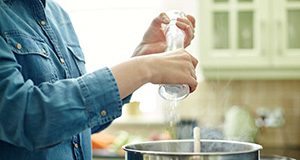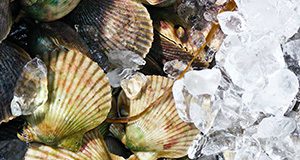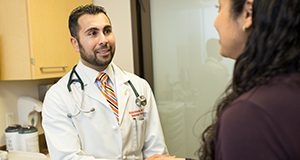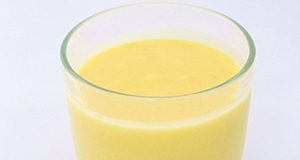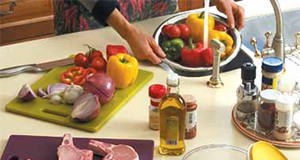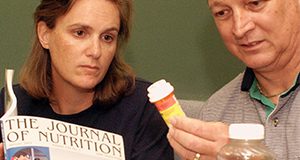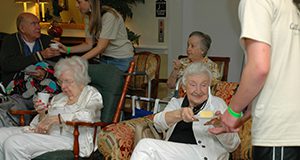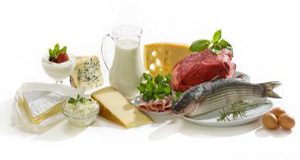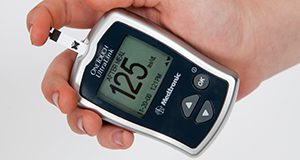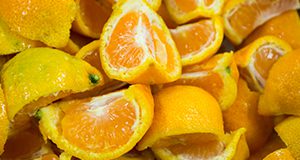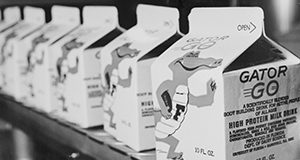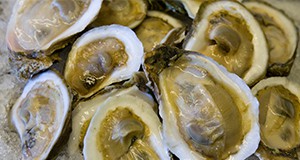Sodium is important for our body to maintain fluid balance, blood volume, and blood pressure; however, many people consume more dietary sodium (from salt) than needed. This 3-page publication explores the health effects of excessive sodium intake and ways to decrease intake of this mineral. Written by Asmaa Fatani, Nancy J. Gal, and Wendy J. Dahl and published by the UF/IFAS Department of Food Science and Human Nutrition, August 2018.
http://edis.ifas.ufl.edu/fs312
Category: Health & Nutrition
Best Practices for Scalloping: From the Boat to Your Plate
Recreational scalloping in Florida is a popular group activity for many residents and visitors throughout the summer months. This 6-page fact sheet written by Brittany Hall-Scharf, Sarah Ellis, and Savanna Barry and published by the UF/IFAS Florida Sea Grant College Program lists the legal requirements for boating and scalloping, provides a safety plan to minimize and/or prevent accidents while you’re out on the water, and explains proper shucking methods to ensure that the meals you make from your catch will be safe and delicious.
https://edis.ifas.ufl.edu/sg158
The Mediterranean Eating Pattern
Americans looking for an approach to healthy eating may want to consider the Mediterranean eating pattern. The Mediterranean eating pattern emphasizes fruits, vegetables, legumes, whole grains, nuts, and olive oil. It also includes moderate amounts of fish and poultry. This 3-page fact sheet discusses health benefits and ways to follow the Mediterranean eating pattern. Written by Sheila Rahimpour and Karla P. Shelnutt, and published by the UF/IFAS Department of Family, Youth and Community Sciences, May 2018.
http://edis.ifas.ufl.edu/fy1476
Breast Cancer: When the Woman You Love Has Breast Cancer
For the person with breast cancer, a diagnosis causes her life to suddenly and dramatically change. As treatment progresses, the patient has a multitude of doctor visits, procedures, and often support groups to keep her busy and focused. Her partner's challenges are also significant, but unfortunately they are frequently overlooked. This 4-page fact sheet is the second document in a 12-part series on breast cancer. It provides perspectives and suggestions for persons who are accompanying a woman through breast cancer treatment. Written by Martha C. Monroe, Barbara F. Shea, and Linda B. Bobroff, and published by the UF/IFAS Department of Family, Youth and Community Sciences, revised April 2018.
http://edis.ifas.ufl.edu/fy896
Enfermedad Renal Cronica (ERC): Una guia de alimentos can alto contenido de fibra
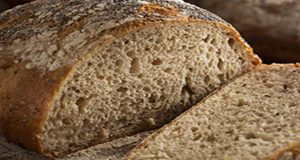
Vivir con la enfermedad renal crónica (ERC) presenta muchos desafíos, y la dieta es uno de ellos. Las personas con ERC pueden tener dificultades para consumir suficientes alimentos ricos en fibra al seguir las otras recomendaciones de dieta para la ERC..
This is the Spanish-language version of FS305, CKD: A Guide to Higher Fiber Foods. Written by Wendy J. Dahl and published by the UF/IFAS Department of Food Science and Human Nutrition, April 2018.
http://edis.ifas.ufl.edu/fs309
Alimentos en pure: Postres de lenteja
Una dieta en puré puede ser recomendada para personas con problemas para tragar. Es una dieta que requiere que los alimentos sean mezclados o procesados para obtener una textura suave, similar a un pudín..
This is the Spanish-language version of FS306, Pureéd Foods: Lentil Desserts. Written by Wendy J. Dahl and published by the UF/IFAS Department of Food Science and Human Nutrition, April 2018.
http://edis.ifas.ufl.edu/fs310
La Dieta y la Salud del Cerebro
Seguir una dieta saludable proporciona muchos beneficios a lo largo del ciclo de la vida. Mantener buenos hábitos de alimentación a medida que envejecemos puede ser especialmente útil para preservar la salud cognitiva―la capacidad de recordar, aprender y tomar decisiones.
This is the Spanish-language version of FSHN17-9/FS304, Diet and Brain Health. This 4-page document provides tips for healthful eating that may help to maximize brain health in older adults. Written by Wendy J. Dahl and published by the UF/IFAS Department of Food Science and Human Nutrition, April 2018.
http://edis.ifas.ufl.edu/fs307
Vida Saludable: Use sus medicinas de una manera segura
Las medicinas nos pueden hacer sentir mejor y mejorar nuestra salud, pero si no las usamos correctamente nos pueden hacer sentir peor o hasta causarnos problemas de salud mayores. This is the Spanish-language version of FCS8594/FY667, Healthy Living: Use Your Medicines Safely! This 5-page document provides tips to help you use your medicines safely. Written by Paulina Wittkowsky, Linda B. Bobroff, and Emily Minton, and published by the UF/IFAS Department of Family, Youth and Community Sciences, revised February 2018.
http://edis.ifas.ufl.edu/fy668
Elder Nutrition
Older Floridians, their families, and communities face many issues related to aging. This 8-page fact sheet focuses on the way aging affects nutrition and diet, and choices that older adults can make to improve or maintain their health and well-being as they age. Written by Linda B. Bobroff and Martie Gillen, and published by the UF/IFAS Department of Family, Youth and Community Sciences, revised March 2018.
http://edis.ifas.ufl.edu/fy628
La Proteina y El Adulto Mayor
La proteína es un nutriente que provee energía a nuestro cuerpo y está involucrado en muchas funciones vitales como el reparo, mantenimiento y buen funcionamiento del sistema inmunológico.
This is the Spanish-language version of FSHN17-2/FS290, Protein and the Older Adult. This 3-page document describes the nutritional characteristics and requirements of protein in older adults. Written by Wendy J. Dahl and published by the UF/IFAS Department of Food Science and Human Nutrition, April 2018.
http://edis.ifas.ufl.edu/fs308
Swimmer's Itch (Cercarial Dermatitis)
Learn how to swim safely and avoid this itchy skin rash in this 3-page document written by Emma N. I. Weeks and Katherine Sayler and published by the UF/IFAS Department of Entomology and Nematology.
http://edis.ifas.ufl.edu/in1200
Symptoms and Treatment of Low Blood Glucose
Low blood glucose, also called hypoglycemia, can be life-threatening for people with diabetes. It can be caused by eating too little food, taking too much insulin or other diabetes medication, or being extra active. If left untreated, low blood glucose can progress to diabetic coma. Everyone with diabetes needs to know the symptoms of low blood glucose so they can take action right away. This 2-page fact sheet discusses preparation, symptoms, and treatment. Written by Linda B. Bobroff, and published by the UF/IFAS Department of Family, Youth and Community Sciences, revised February 2018.
http://edis.ifas.ufl.edu/fy521
Nutrition for Health and Fitness: Fiber in Your Diet
Whether you call it dietary fiber, fiber, or roughage, eating a diet rich in this food component is good for your health. This 8-page fact sheet provides tips on how to include foods with fiber in your diet. Written by Linda B. Bobroff, and published by the UF/IFAS Department of Family, Youth and Community Sciences, revised March 2018.
http://edis.ifas.ufl.edu/he697
Nutrition for Health and Fitness: Sodium in Your Diet
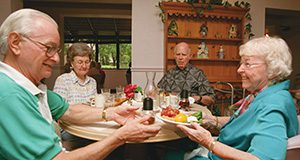
The foods you eat and the way you prepare and serve them affect the amount of sodium in your diet. This 5-page fact sheet Written by Linda B. Bobroff, and published by the UF/IFAS Department of Family, Youth and Community Sciences will help you evaluate your sodium intake.
edis.ifas.ufl.edu/he696
Pureed Foods: Lentil Desserts
A pureed diet may be recommended for individuals with swallowing problems; however, it can be challenging for those with a puréed diet to receive adequate protein, fiber, vitamins, and minerals. This 4-page document provides recipes made with puréed lentils, offering desserts that are both tasty and nutrient-dense. Written by Wendy J. Dahl and Alison O’Donoughue and published by the UF/IFAS Department of Food Science and Human Nutrition, March 2018.
http://edis.ifas.ufl.edu/fs306
Alimentacion Saludable: El calcio
El calcio es el mineral principal que se encuentra en nuestros huesos y dientes. Nosotros necesitamos calcio para el buen funcionamiento de los músculos y los nervios. Written by Linda B. Bobroff, and published by the UF/IFAS Department of Family, Youth and Community Sciences, revised January 2018.
http://edis.ifas.ufl.edu/fy069
Vida Saludable: Los alimentos pueden afectar sus medicamentos
Algunos alimentos pueden afectar la manera en que los medicamentos con prescripción o sin prescripción médica funcionan, ya sea retardando, disminuyendo o aumentando la cantidad del medicamento que el cuerpo absorbe. Esto puede ocasionar efectos secundarios peligrosos y no deseados. Written by Paulina Wittkowsky and Linda B. Bobroff, and published by the UF/IFAS Department of Family, Youth and Community Sciences, revised January 2018.
http://edis.ifas.ufl.edu/fy677
Reducing Your Risk for Diabetes: A Resource Guide
Many free resources are available to help people of all backgrounds lead healthier lives and reduce their risk for diabetes. This 3-page fact sheet is a major revision that provides resources to help people take steps to improve their health. Written by Linda B. Bobroff, and published by the UF/IFAS Department of Family, Youth and Community Sciences, revised February 2018.
http://edis.ifas.ufl.edu/fy933
Facts About Vitamin B12
Vitamin B12 works with folate, another B vitamin, to make DNA, our body's genetic material. B12 is needed for proper formation of red blood cells and protection of nerve cells. This 2-page fact sheet discusses vitamin B12 requirements, ways to get enough vitamin B12, and effects of vitamin B12 deficiency. Written by Linda B. Bobroff, and published by the UF/IFAS Department of Family, Youth and Community Sciences, revised January 2018.
http://edis.ifas.ufl.edu/fy214
Healthy Living: Changing Your Lifestyle to Improve Your Blood Pressure
Most people know that high blood pressure can often be improved by making smart dietary choices and choosing foods lower in sodium. But did you know there are other ways to help control high blood pressure and even prevent it? This 4-page fact sheet is a major revision that discusses four lifestyle changes that can help you keep blood pressure down. Written by Karla P. Shelnutt and Linda B. Bobroff, and published by the UF/IFAS Department of Family, Youth and Community Sciences, revised February 2018.
http://edis.ifas.ufl.edu/fy1129
